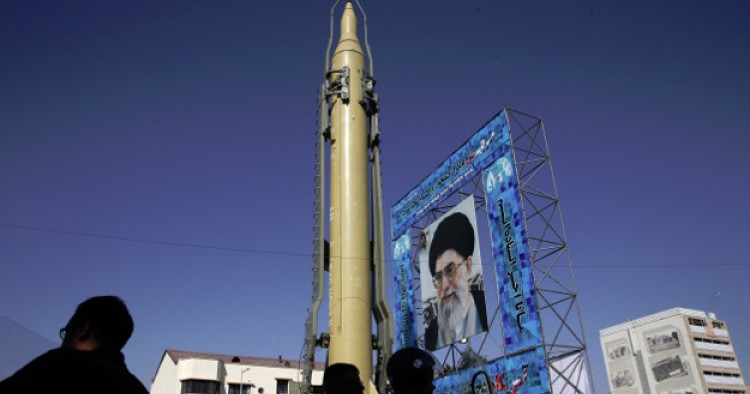Iran’s President Hassan Rouhani hailed efforts by the Islamic Revolution Guards Corps (I.R.G.C.) to develop and employ advanced weapons to protect the country, Iranian media reported. “I’d like to thank the ones that manufacture strategic arms for the country and the ones that employ such strategic weapons very well,” Rouhani said in a meeting of top Iranian officials and ambassadors of Islamic nations on the occasion of Eid in Tehran. He made the remarks a week after the I.R.G.C. launched six ballistic missiles against Islamic State positions in Syria in retaliation for June 7 terrorist attacks in Tehran. The Iranian president added that the missile strikes represented only a small part of Iran’s defense and military capabilities.
Comment: The Rouhani government and hardliners in Iran differ on how to approach the Trump administration, which has taken a tougher stance on Iran. While the Iranian president and his foreign minister, Javad Zarif, prefer to engage with Washington to defuse tension and minimize the potential for additional U.S. sanctions, the I.R.G.C. and hardline clerics favor a more confrontational posture and oppose diplomacy with the United States.
But when it comes to Iran’s controversial missile program or other defense capabilities, the Rouhani government and hardliners are largely on the same page. Rouhani has repeatedly stressed that Tehran will seek “no one’s permission” to build missiles and upgrade the country’s defense power. “We have repeatedly declared that strengthening the defensive prowess of Iran’s Armed Forces is only aimed at defending the country and will never be used against another country,” he said in April at a ceremony held in Tehran to unveil new domestically-manufactured defense achievements. “[Striking] a regional balance and maintaining the defensive and deterrent power of a pivotal country like Iran, which has endangered big powers’ interests through its great [Islamic] Revolution and is conveying the message of justice and freedom to the world, are necessary,” he added.
Iran’s missile program has been a constant source of tension between Washington and Tehran since President Donald Trump took office in January. While the nuclear agreement Tehran signed with world powers in 2015 does not address Iran’s missile program, a subsequent U.N. Security Council Resolution 2231 calls upon Iran “to undertake any activity related to ballistic missiles designed to be capable of delivering nuclear weapons, including launches using such ballistic missile technology.” Iranian officials argue that the country’s missiles are not designed to carry nuclear warheads, but Western officials say some of the missiles Iran has tested after the 2015 nuclear deal have been "inherently capable of delivering nuclear weapons" and are "in defiance of" the U.N. resolution.
During his reelection campaign last month, Rouhani pledged to engage with the United States and European countries to remove the remaining sanctions that continue to hinder economic growth and foreign investment in Iran. But as the president is encouraging the I.R.G.C. to continue its missile activities, he will certainly not be able to fulfill his campaign promise as most of existing U.S. unilateral sanctions against Iran are related to the country’s missile program and support for terrorism.
The Middle East Institute (MEI) is an independent, non-partisan, non-for-profit, educational organization. It does not engage in advocacy and its scholars’ opinions are their own. MEI welcomes financial donations, but retains sole editorial control over its work and its publications reflect only the authors’ views. For a listing of MEI donors, please click here.













